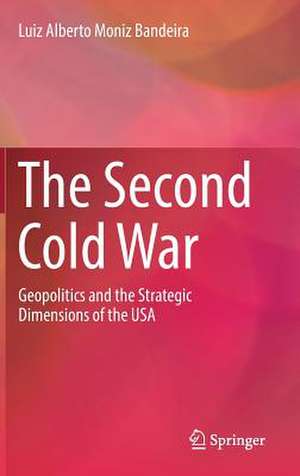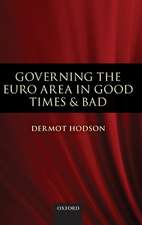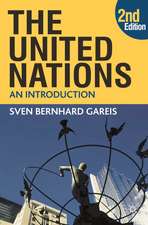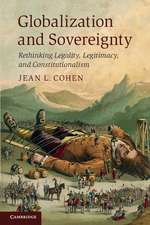The Second Cold War: Geopolitics and the Strategic Dimensions of the USA
Autor Luiz Alberto Moniz Bandeiraen Limba Engleză Hardback – 9 iun 2017
This book investigates the geopolitics and strategic dimensions of US-American foreign policy during George W. Bush's and Barack Obama's presidential terms. Based on a vast amount of empirical and historical sources, the author offers deep insights into the recent political developments ('Arabellions') along the axis of Northern Africa, the Middle East, and Central Asia, situating them in the context of the global geopolitical and geo-economical Great Game, either latent or overt, between USA/NATO and Russia. The author also analyses the influence of the US on these historical and political processes in the last two decades.
| Toate formatele și edițiile | Preț | Express |
|---|---|---|
| Paperback (1) | 650.19 lei 6-8 săpt. | |
| Springer International Publishing – aug 2018 | 650.19 lei 6-8 săpt. | |
| Hardback (1) | 905.68 lei 6-8 săpt. | |
| Springer International Publishing – 9 iun 2017 | 905.68 lei 6-8 săpt. |
Preț: 905.68 lei
Preț vechi: 1104.48 lei
-18% Nou
Puncte Express: 1359
Preț estimativ în valută:
173.30€ • 181.40$ • 144.24£
173.30€ • 181.40$ • 144.24£
Carte tipărită la comandă
Livrare economică 31 martie-14 aprilie
Preluare comenzi: 021 569.72.76
Specificații
ISBN-13: 9783319548876
ISBN-10: 3319548875
Pagini: 390
Ilustrații: XXVII, 465 p. 53 illus.
Dimensiuni: 155 x 235 mm
Greutate: 0.87 kg
Ediția:1st ed. 2017
Editura: Springer International Publishing
Colecția Springer
Locul publicării:Cham, Switzerland
ISBN-10: 3319548875
Pagini: 390
Ilustrații: XXVII, 465 p. 53 illus.
Dimensiuni: 155 x 235 mm
Greutate: 0.87 kg
Ediția:1st ed. 2017
Editura: Springer International Publishing
Colecția Springer
Locul publicării:Cham, Switzerland
Cuprins
Chapter 1: The Geopolitical Great Game in Eurasia, the Middle East and North Africa.- Chapter 2: The Second Cold War – A First Panoramic View.- Chapter 3: The Second Cold War under the Sign of Oil and Gas.- Chapter 4: From Bush’s Freedom Agenda to the Color Revolutions.- Chapter 5: The "Cold Revolutionary War“ and the NATO expansion towards the East.- Chapter 6: The Xinjiang Issue and Washington’s China Strategy.- Chapter 7: The Invasion of Iraq – Open and Latent Purposes.- Chapter 8: The Military Occupation of the Middle East and the Crash of 2008.- Chapter 9: USA, Afghanistan, Irak: Economic Constraints and Tragedy.- Chapter 10: The Technological War on Terror.- Chapter 11: Drones and Kill/Capture Campaign in Pakistan.- Chapter 12: Multiplication of War and Conflict from Tunisia to the Middle East.- Chapter 13: The Uprising in Libya.- Chapter 14: NATO Intervention as an Answer to Gaddafi’s Goodwill Measures.- Chapter 15: US and NATO Attempts to Maintain World Domination.- Chapter 16:Humanitarian Intervention and the Credibility Issue in Libya.- Chapter 17: Religious Antagonism and Islamic Uprising from Tunisia to Saudi-Arabia.- Chapter 18: Terror and Antiterror in North Africa.- Chapter 19: The Uprising in Syria.- Chapter 20: Real and Psychological War in Syria as a Pivot Country.- Chapter 21: Great Syria as the End-of-Days Scenario.- Chapter 22: Global Power Shift and Military Outsourcing.- Chapter 23: Great Israel, Israel and Palestina.- Chapter 24: Israel‘s Vulnerability and Iran’s Nuclear Program.- Chapter 25: Israel on the Eve of Apocalypse?.- Chapter 26: "Arab Spring": Democracy, Chaos and Terror.- Chapter 27: A Short History of Islam – From Muhammad to the War on Terror.
Notă biografică
Prof. Dr. Luiz Alberto de Vianna Moniz Bandeira, Baron de São Marcos, is graduated in juridical sciences, and also holds a Ph.D. in political science from the University of São Paulo. He was professor at the Escola de Sociologia e Política de São Paulo. In 1976, he received grants from, among other institutions, the Ford Foundation, to conduct research in Argentina, Uruguay, and Paraguay on Brazil's historical role in the Río de la Plata Basin. From 1977 through 1979, he extended this research project to the United States and Europe, thanks to a post-doctoral fellowship awarded by the Social Science Research Council and the Joint Committee on Latin America Studies of the American Council of Learned Societies in New York. He held the Chair of History of Brazilian Foreign Policy in the Department of History at the University of Brasília. He was awarded the Juca Pato Prize and named as Brazilian Intellectual of 2005 for the book Formação do Império Americano (Da Guerra contra aEspanha à Guerra no Iraque). He was subsequently awarded an honorary doctorate by UniBrasil in Curitiba and by Federal University of Bahia. Bandeira has been invited to lecture in many countries around the world. He was an Under-Secretary in Rio de Janeiro’s State Government, being its representative in the federal capital, Brasília from 1991 through 1994 and a cultural attaché at the Consulate-General of Brazil in Frankfurt am Main from 1996 through 2002.
Luiz Alberto de Vianna Bandeira has been awarded the Cross of Merit by Germany and the Gran-Cross of Baron of Rio Branco, by Brasil.
Textul de pe ultima copertă
This book investigates the geopolitics and strategic dimensions of US-American foreign policy under the presidents George W. Bush and Barack Obama. Based on a vast amount of empirical and historical sources, the author offers deep insights into the recent political developments such as the Arabellions along the axis of Northern Africa, the Middle East, and Central Asia, situating them in the context of the global geopolitical and geo-economical Great Game, either latent or overt, between USA/NATO and Russia. The author also analyses how US politics has influenced these historical and political processes in the last two decades.
Caracteristici
Investigates the geopolitics and strategic dimensions of US-American foreign policy Offers a historical and political analysis of the Arabellions and their implications for the global Great Game Illustrates why non-intervention is a precondition for international peace Includes supplementary material: sn.pub/extras















